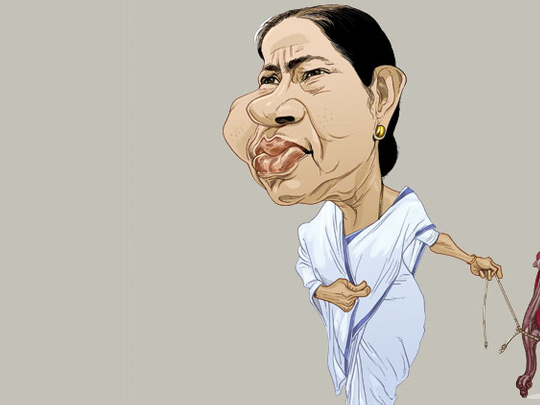
Four years ago, when Ratan Tata was forced by Mamata Banerjee to abandon his Nano factory in West Bengal, he received a single word SMS from Gujarat Chief Minister Narendra Modi: “Suswagatam” or “most welcome”. Tata moved his $2,500 (Dh9,195) people’s car manufacturing facility to Sanand in Gujarat. Also went with it thousands of jobs and millions of dollars worth of investment. What followed next turned Sanand, a tiny town, into a busy auto manufacturing hub. Ford, Peugeot and Hitachi were quick to follow Tata to Sanand. While Modi became a darling of India Inc., Mamata stood out as the villain. By driving Tata out, she had shot herself in the foot and deprived a poor, underdeveloped West Bengal of precious investment.
Last week, another SMS, this time from her own phone, threatened to further isolate West Bengal from mainstream Indian politics and antagonise the business community. Hours after the Indian government announced it will allow 51 per cent foreign direct investment (FDI) in multiple-brand retail, Mamata shot an SMS to Congress chief Sonia Gandhi, opposing the move that is seen both by domestic and global business leaders as India’s biggest reform announcement in recent years. Mamata, an important ally of the ruling coalition United Progressive Alliance (UPA), set a 72-hour deadline to roll back the FDI announcement and hike in diesel and LPG prices. Fed up with Mamata’s blackmailing tactics and tantrums, the ruling Congress decided to call her bluff and refused to oblige her this time. Last Tuesday, she announced that her party of 19 MPs was pulling out, effectively reducing the UPA government to a minority. By taking an anti-reform stance, Mamata has this time shot herself in the mouth.
Born in 1955, Mamata made her parliament debut on a Congress ticket in 1984 and was one of the youngest MPs. After accusing Congress of behaving like a stooge of the Leftists in Bengal, she quit the party and floated Trinamool Congress (TMC) in 1997. Two years later, she joined the National Democratic Alliance (NDA) government as minister for railways, but left the coalition in 2001 to join hands with Congress. Over the years, she became the cheerleader of Bengal’s poor, but it took her 10 years to build the TMC into a formidable force that eventually defeated the ‘Dragon’ in West Bengal. Mamata came to power in 2011 after a historic rout of the Left parties who ruled this eastern Indian state for 34 years. Fed up with the poor governance of the Left, people of West Bengal decisively voted for Mamata’s party. Her victory was stunning and remarkable, given the fact that the Leftist ideology was ingrained into the DNA of an average Bengali voter.
In India, decisive mandates do not guarantee good governance. Today, Mamata lords over a state that is India’s most indebted, $40 billion in latest estimates. Her policies and autocratic behaviour have driven away domestic and foreign investors. “In just one year after she came to power, disillusionment against her is in full swing,” quipped a journalist. A sense of regret to have voted Banerjee to power is not limited to the urban elite. It is widespread. Her choice of ministers, policy decisions, handling of the media and her inability to take criticism have come under attack in India and abroad. “Her economic policies outflank even the Communists on the left,” wrote Economist early this year, adding: “Ms Banerjee’s political approach is to dish out public jobs and welfare and protect small farmers and to duck reforms that might lure investors to the state. Her government did recently pass a law allowing business to lease modest plots of public land. Yet, she vows loudly never to help industry buy it. And with land titles a confused mess of fragmented ownership, it is likely that land-hungry firms will stay away.”
To most observers, Mamata essentially behaves like a single-man demolition squad. Any opposition, within her party or outside, is dealt with ruthlessly. When her party colleague and former railway minister, Dinesh Trivedi, announced a hike in train fares without consulting her, Banerjee summoned him to Kolkata and forced him to resign. She then appointed a trusted man who now spends more time in Kolkata by her side than looking after the ministry in Delhi. Her actions in recent months defy logic and have invited ridicule and disdain even from those who voted her to power. Sample this: She refused to intervene when a college professor was arrested after he shared her cartoon on facebook; she transferred an upright police officer investigating a gang rape case and accused the rape victim of conspiring against her government; she ordered public libraries to ban all newspapers that criticise her style of governance.
Mamata’s supporters dismiss all criticism and cite her simplicity, honesty, firebrand oratory and pro-poor policies. Unlike pompous, rich politicians in other parts of India, she prefers to be driven around in a tottering hatchback, lives in an ordinary house and stays away from her official mansion. Her trademark cheap cotton saris, rubber footwear, wrinkled face, unkempt hair are hallmark of a trade union leader or a grass roots politician. But, her opponents argue, simplicity and honesty are no excuse for poor governance, arrogance and an anti-business stance. After her decision to quit UPA, what happens next is anybody’s guess, but one thing is certain: West Bengal can hardly expect favours from Prime Minister Manmohan Singh’s government.










